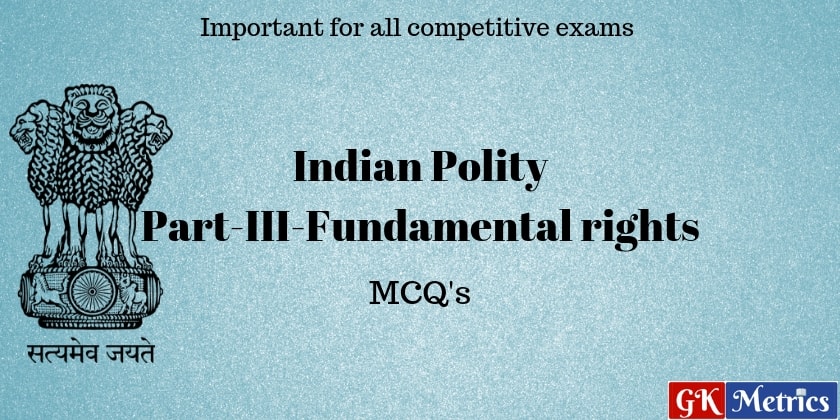Introduction:
Fundamental rights in the Constitution have been mentioned in Article(12-35). The fundamental right is the right to which the State Government is bound to get them, so if the person does not, then the person can go directly to the Supreme Court or High Court.
1. Article (12) – State Definition
2. Article (13) – Right to make law
• Article 13A – Judicial Review
3. Article (14-18) – Right to Equality
• Article 14 – Equality before law
• Article 15 – Prohibition of Discrimination on the basis of religion, race, sex and place of birth.
• Article 16 – Equality of opportunity in relation to public planning
• Article 17 – End of Untouchability
• Article 18 – elimination of titles
4. Article (19-22) – Right to Freedom
• Article (19) – Protection of certain rights in relation to the freedom of speech, ETC.
• Article 20 – security in relation to the proposals for proposals
• Article 21 – The Safety of Life and Personal Liberty
• Article 21A – Right to Education
• Article 22 – In some cases security against Australians and Detenens
5. Article (23-24) – rights against exploitation
• Article 23 – Prevention of Traffic in Human Diseases and Ford Labor
• Article 24 – Prevention of employment of children in factories, ETC.
6. Article (25-28) – Right to freedom of religion
• Article 25 – freedom of condolences and promotion of free professional, practice and secularism.
• Article 26 – Freedom of managing trustworthy matters
• Article 27 – Freedom to pay taxes for the promotion of any particular religion
• Article 28 – Freedom in the form of independent instruction in independent education or freedom in trustworthy education
7. Articles (29-30) – Culture and Education Rights
• Article 29 – Protection of Minority Interests
• Article 30 – Right to Minorities and Administrator Educational Institutions to Establish
8. Article 31 – The overall acquisition of the property {Now it is not a fundamental right}
9. Article (32) – Right to Constitutional Remedies
MCQ’s of Fundamental Rights
1. Which one of the following right of Indian Constitution guarantees all the fundamental rights to every resident of a country?
A. Right against exploitation
B. Right to freedom
C. Right to equality
D. Right to constitutional remedies
[toggle] Answer – D[/toggle]
2. Which one of the following is true with respect to the Fundamental Rights of Indian Constitution?
A. The sovereignty of the people
B. Equality of opportunity for all resident
C. Limited government
D. Democracy
[toggle] Answer – B[/toggle]
3. B. R. Ambedkar termed Article 32 of the Indian Constitution as the “Heart and Soul of the Indian Constitution”. Which one of the following fundamental right it contains ?
A. Right to freedom
B. Right to constitutional remedies
C. Right to elementary education
D. Right to freedom of religion
[toggle] Answer – B[/toggle]
4. On which of the following day, United Nations General Assembly ratified its universal declaration on human rights ?
A. October 24, 1945
B. December 10, 1948
C. December 16, 1966
D. April 25, 1995
[toggle] Answer – B[/toggle]
5. Which of the following Articles contain the right to religious freedom?
A. 25-28
B. 29-30
C. 32-35
D. 23-24
[toggle] Answer – A[/toggle]
6. Which of the following can a court issue for enforcement of Fundamental Rights ?
A. A decree
B. A writ
C. An Ordinance
D. A notification
[toggle] Answer – B[/toggle]
7. Which article of the Constitution abolishes Untouchability?
A. Article 18
B. Article 15
C. Article 14
D. Article 17
[toggle] Answer – D [/toggle]
8. Which of the following is correct with respect to “Right against exploitation”?
A. Prohibition of traffic in human beings and forced labour
B. Freedom as to payment of taxes for the promotion of any particular religion
C. Protection of interests of minorities
D. Equality before law
[toggle] Answer – A [/toggle]
9. In which part of the Indian Constitution, the Fundamental rights are provided?
A. Part II
B. Part III
C. Part V
D. Part IV
[toggle] Answer – A [/toggle]
10. Prohibition of discrimination on grounds of religion, race, caste, sex or place of birth is a fundamental right classifiable under?
A. Right to freedom of religion
B. Right to equality
C. Right against expolitation
D. None of these
[toggle] Answer – B [/toggle]


Thanks for your help sir